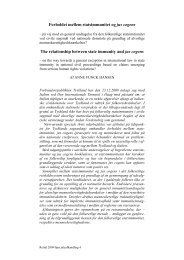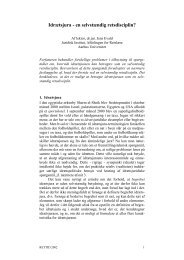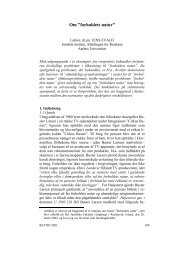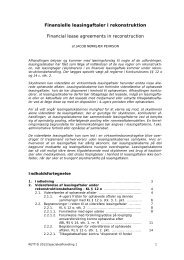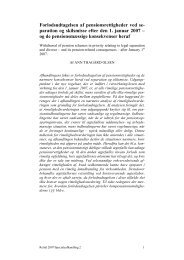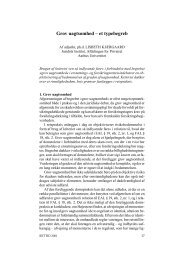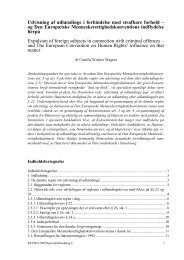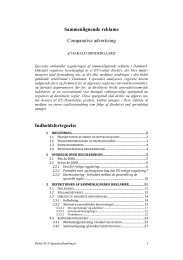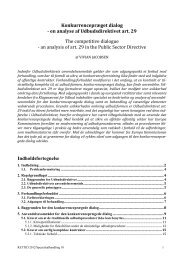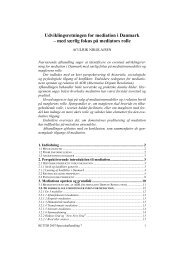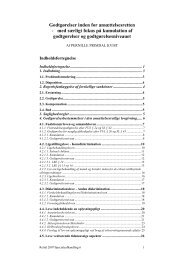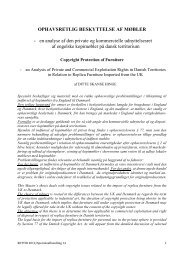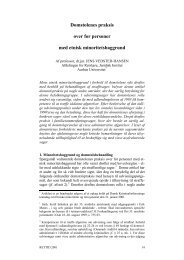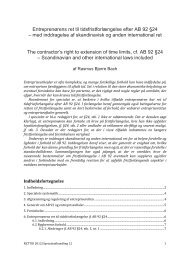Product liability under the CISG and Concurring tort law claims ...
Product liability under the CISG and Concurring tort law claims ...
Product liability under the CISG and Concurring tort law claims ...
Create successful ePaper yourself
Turn your PDF publications into a flip-book with our unique Google optimized e-Paper software.
3. DAMAGE TO PROPERTY<br />
3.1. Introduction<br />
By clear implication art 5 <strong>CISG</strong> permits a buyer to make a claim for compensation <strong>under</strong> <strong>the</strong> Convention<br />
regime in situations, where non-conforming goods cause damages to <strong>the</strong> buyer´s property. Thus, damage to<br />
property is regarded as within <strong>the</strong> scope of <strong>the</strong> Convention. 43<br />
This is supported by <strong>the</strong> wording of art 5 of <strong>the</strong> Convention, which excludes only damages due to death or<br />
“personal” injury. The word “personal” was specifically inserted in <strong>the</strong> provision in an attempt to eliminate<br />
any possibility of doubt, as to whe<strong>the</strong>r <strong>the</strong> provision also covered damages to property. 44 Consequently, <strong>the</strong><br />
legislative history of art 5 demonstrates that <strong>the</strong>re is no gap which needs to be filled by an analogy of art<br />
5. 45<br />
Consequently, in cases of damage to property due to a breach of contract, <strong>the</strong> buyer can claim damages for<br />
<strong>the</strong> loss incurred according to art 45(1)(b) <strong>CISG</strong> if <strong>the</strong> buyer has fulfilled <strong>the</strong> notice requirements in art 39<br />
<strong>CISG</strong> <strong>and</strong> if <strong>the</strong> preconditions in art 74 <strong>CISG</strong> have been fulfilled.<br />
Art 74 governs <strong>the</strong> scope of a buyers claim to compensation for <strong>the</strong> breach of a contractual obligation. It<br />
contains two essential notions: <strong>the</strong> principle of full compensation <strong>and</strong> <strong>the</strong> limitation of <strong>liability</strong> by <strong>the</strong> foreseeability<br />
rule.<br />
Art 74 <strong>CISG</strong> requires <strong>the</strong> existence of a claim for damage pursuant to art 45(1)(b) <strong>CISG</strong>, which requires a<br />
breach of a contractual obligation. The Convention does not define in greater detail, which losses are recoverable<br />
<strong>and</strong> <strong>the</strong>refore recoverability has to be determined in accordance with <strong>the</strong> overall objective to achieve<br />
full compensation in view of <strong>the</strong> particular purpose of <strong>the</strong> contract. 46 The type of loss relevant here is consequential<br />
loss resulting from a breach of contract. Consequential loss is a recoverable loss <strong>under</strong> <strong>the</strong> Convention.<br />
47 It includes <strong>claims</strong> for recourse, damage to property <strong>and</strong> non-pecuniary losses.<br />
According to Professor Stoll, <strong>the</strong> foreseeability rule in art 74 <strong>CISG</strong> is ill-suited to deal with <strong>the</strong> loss, which<br />
defective goods cause to property. The reason for this is that it is always foreseeable that delivering dangerously<br />
defective goods may cause a loss. 48 Damage to property is consequently always foreseeable. 49 The<br />
only effect of <strong>the</strong> foreseeability rule in <strong>the</strong>se situations is <strong>the</strong>refore as a rule to determine, whe<strong>the</strong>r <strong>the</strong> occurred<br />
loss lies within <strong>the</strong> typical risk created by <strong>the</strong> seller when delivering defective goods. This does, however,<br />
not in this author´s opinion present an obstacle in relation to claiming damages due to damage to<br />
property, but merely represents common sense regarding <strong>the</strong> extent of <strong>liability</strong>.<br />
Claims for losses due to damage to property may also be subject to domestic product <strong>liability</strong> <strong>law</strong>s. This<br />
raises <strong>the</strong> questions: how should <strong>the</strong> relationship between <strong>the</strong> Convention <strong>and</strong> domestic <strong>tort</strong> <strong>law</strong> be, <strong>and</strong><br />
should concurring domestic <strong>tort</strong> <strong>law</strong> <strong>claims</strong> be allowed or dismissed. These issues, which have been fiercely<br />
disputed, will be analyzed in detail in section 4 of this <strong>the</strong>sis.<br />
43 Lookofsky, In dubio, page 287, Hachem in Schwenzer page 96 para 2 <strong>and</strong> page 99 para 11, Magnus in Staudingers<br />
page 144 para 9 <strong>and</strong> Schlechtriem/Butler page 40 para 40.<br />
44 (A/CONF.97/C.1/SR.35) para 37 <strong>and</strong> (A/CONF/97/SR.6), para 24.<br />
45 Hachem in Schwenzer page 96 para 2.<br />
46 Schwenzer page 1005 para 18. The main objective of <strong>the</strong> performance principle is to protect <strong>the</strong> promise in obtaining<br />
performance as required by <strong>the</strong> contract.<br />
47 Schwenzer page 1006 para 20 <strong>and</strong> page 1012 para 32.<br />
48 Stoll in Schlechtriem/Thomas page 571 para 44.<br />
49 Schwenzer page 1022 para 57.<br />
RETTID 2012/Specialeafh<strong>and</strong>ling 26 14



